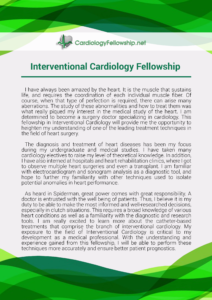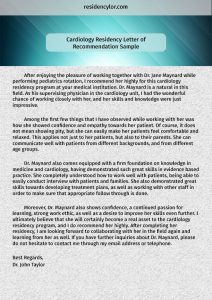Getting into a Cardiology Sub-Specialty Program
One of the most difficult sub-specialties to get into after completing your residency in internal medicine is cardiology. Cardiology is among the most popular internal medicine sub-specialties and every year many applicants fail to match with a program. That doesn’t mean that there is no chance of matching in the cardiology subspecialty. It won’t be easy but if you are determined to be in the field of cardiology, it is possible if you put in the time and effort. You just need to choose what of the many cardiology fellowship programs fits you the best and do everything, you can for getting it.
List of Best Cardiology Programs
Just as some medical schools are better than others, the same holds true for cardiology fellowships. Completing a fellowship in cardiology from a top program will provide you with more opportunities. Here is a list of some of the top cardiology programs you can apply to:
 Stanford University Stanford, CA
Stanford University Stanford, CA- University of California-San Francisco San Francisco, CA
- John Hopkins University Baltimore, MD
- University of Pennsylvania Philadelphia, PA
- Case Western Reserve University Cleveland, OH
- Harvard University Cambridge, MA
- University of California-Los Angeles Los Angeles, CA
- Washington University School of Medicine Saint Louis, MO
- Columbia University New York, NY
- Yale University New Haven, CT
Not everybody can get into one of the top programs but many residents like to apply to at least one if they feel they have the necessary qualifications. To succeed in your application, you will need to write a quality personal statement for cardiology fellowship.
If you want to choose particular variant, this post about echocardiography fellowships is for you!
Documents Needed When Applying to Top Cardiology Programs
The documents you will have to submit when applying for a cardiology fellowship may vary slightly from program to program but will be similar. When applying for a fellowship, applicants have to be ABIM (American Board of Internal Medicine) board certified or board eligible. Documents you will be required to submit may include:
 ERAS (Electronic Residency Application Service) application
ERAS (Electronic Residency Application Service) application- Official medical school transcript
- Curriculum Vitae (CV)/Resume
- USMLE transcripts
- Three letters of Reference (One letter should be from the director of your internal medicine program)
- MSPE (Medical Student Performance Evaluation)
- Personal Statement
Not every program will require all of the documents listed above but some will. To be on the safe side it is a good idea to prepare all of them. All documents will be submitted to ERAS. ERAS will in turn submit documents to the cardiology fellowship programs selected by the applicant. Check with individual programs to see if there are any additional document requirements.
Tips for Preparing Your Cardiology Fellowship Application
Applying to fellowship programs can be a stressful process, especially for busy internal medicine residents. Here are a few tips you can use during the application process that may increase your chances of being accepted into the cardiology program you want:
- Prepare and submit your application as early as possible: It will take time to get all your information together and you don’t want to risk missing the deadline. Also there is a better chance that your application will be looked at more carefully if it is viewed before the stack of others programs will receive
- Put some time and effort into your personal statement: The personal statement is one of your best chances of standing out from the crowd. Put some real effort into creating a great personal statement that will generate enough interest to land you an interview
- Get reference letters from people who know you well: You are better off with a reference from somebody who knows you well than a big name who is not very familiar with you
- Apply to your home program: If the cardiology sub-specialty is offered at the institution where you are doing your residency consider applying for a fellowship. Your chances are probably better there than any other program.
Common Mistakes When Applying to Cardiology Fellowship Programs
The following are a few common mistakes residents make when applying to cardiology fellowship programs:
- Only applying to top ten programs: Sure you want to be in a top ten program and you should apply. However you should also hedge your bets by applying for some other programs as well
- Lying or exaggerating: If you lie or exaggerate about your knowledge or involvement in research on your application it will almost certainly come out.
- Underestimating the importance of the personal statement: The personal statement can be the deciding factor as to whether or not you are accepted



